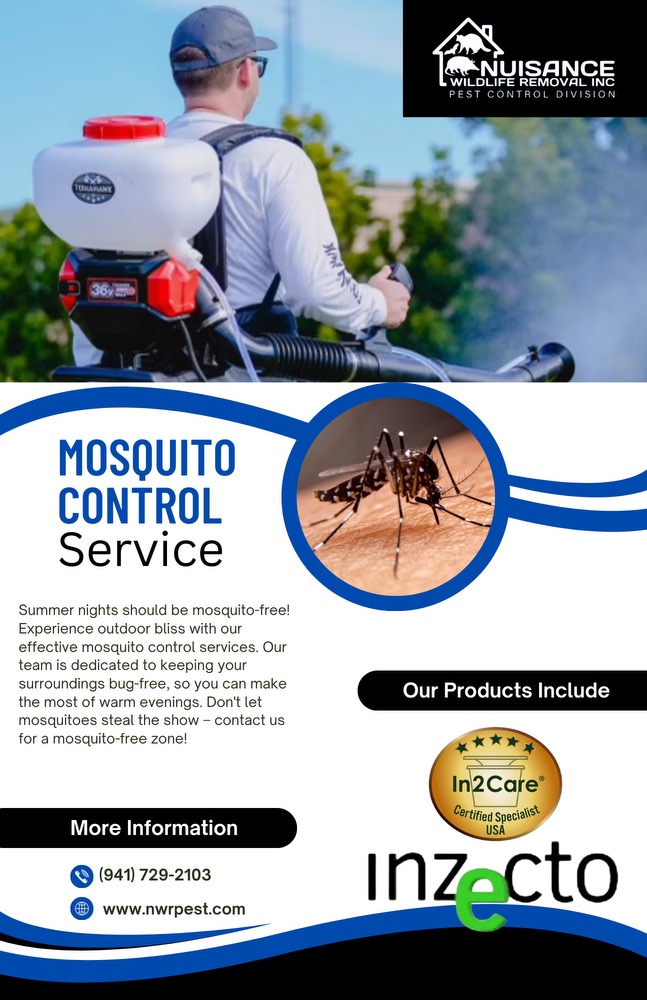If you’ve lived in Parrish, FL, or anywhere in Manatee County, you know that mosquitoes are more than just a nuisance—they can make outdoor life unbearable and even pose serious health risks. Florida’s warm climate and frequent rain create the perfect environment for mosquitoes to breed, and one of the biggest culprits? Standing water.
In this post, we’ll explore how standing water contributes to mosquito problems and what you can do to reduce mosquito populations around your home.
In this post, we’ll explore how standing water contributes to mosquito problems and what you can do to reduce mosquito populations around your home.
Why Standing Water Attracts Mosquitoes
Mosquitoes don’t need much to multiply. Female mosquitoes lay their eggs in standing water, and within 7 to 10 days, those eggs hatch into larvae, which then develop into adult mosquitoes. The more stagnant water around your property, the more mosquitoes you’ll have.

Common Sources of Standing Water in Florida Yards
Many homeowners unknowingly create mosquito breeding grounds right in their backyards. Here are some common places where standing water collects:
• Birdbaths – A favorite spot for mosquitoes if the water isn’t changed regularly.
• Clogged Gutters – Debris traps water, providing a perfect mosquito nursery.
• Plant Saucers – Water collects in the trays under potted plants.
• Old Tires & Buckets – Left outside, they collect rainwater and become mosquito havens.
• Kiddie Pools & Unused Swimming Pools – Even small amounts of water can be a breeding ground.
• Ponds & Decorative Water Features – If not properly maintained with aeration or fish, these can attract mosquitoes.
• Trash Can Lids & Tarps – Water collects in folds or depressions, making them prime mosquito hotspots.
How to Reduce Mosquito Breeding in Your Yard
The best way to control mosquitoes is to eliminate their breeding grounds. Here’s how you can minimize standing water around your property:
1. Empty and Clean Water Containers Regularly
Dump out birdbaths, plant saucers, buckets, and any other containers that collect rainwater at least once a week. This prevents mosquitoes from completing their life cycle.
2. Maintain Your Gutters
Clogged gutters hold water and attract mosquitoes. Keep them clean and free of debris so rainwater flows properly.
3. Fix Drainage Issues
If you have areas in your yard where water pools after a rain, consider grading the landscape or adding gravel to improve drainage.
4. Use Mosquito Dunks or Larvicides in Standing Water
For areas where you can’t remove water—like ponds or rain barrels—use mosquito dunks that contain Bacillus thuringiensis israelensis (Bti), a natural bacteria that kills mosquito larvae but is safe for fish and wildlife.
5. Keep Pools & Water Features Circulating
Mosquitoes prefer stagnant water. Running a fountain, aerator, or pump in decorative ponds keeps the water moving, preventing mosquitoes from laying eggs.
6. Use Mosquito-Repelling Plants
Planting citronella, lavender, marigolds, and lemongrass around your yard can help deter mosquitoes naturally.
7. Call a Professional for Mosquito Control
If mosquito populations become overwhelming, professional pest control treatments can target mosquito breeding sites and provide long-term relief.
The Dangers of Mosquitoes in Florida
Beyond the itching and irritation, mosquitoes can carry dangerous diseases, including:
• West Nile Virus
• Dengue Fever
• Zika Virus
• Eastern Equine Encephalitis (EEE)
Reducing standing water isn’t just about comfort—it’s about protecting your family’s health.

Need Mosquito Control in Parrish, FL? We Can Help!
At Nuisance Wildlife Removal Inc., we offer professional mosquito control services to help keep your yard mosquito-free. Whether you need one-time treatments or ongoing protection, our experts can create a plan tailored to your home’s needs.
Give us a call today at 941-729-2103 or visit NWRpest.com to schedule a consultation!
